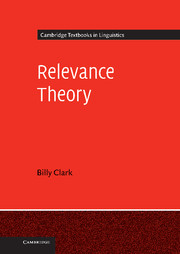Book contents
- Frontmatter
- Contents
- List of Figures and tables
- Preface
- Acknowledgements
- Typographical conventions
- Part I Overview
- Part II Details and developments
- 5 Explicature and implicature
- 6 Types of explicature
- 7 Types of implicature
- 8 Lexical pragmatics
- 9 Figurative language: metaphor
- 10 Figurative language: irony
- 11 Linguistic semantics
- 12 Conclusion: applications and recent developments
- Appendix Key notions of relevance theory
- Notes to chapters
- Bibliography and other resources
- Index
12 - Conclusion: applications and recent developments
from Part II - Details and developments
Published online by Cambridge University Press: 05 June 2013
- Frontmatter
- Contents
- List of Figures and tables
- Preface
- Acknowledgements
- Typographical conventions
- Part I Overview
- Part II Details and developments
- 5 Explicature and implicature
- 6 Types of explicature
- 7 Types of implicature
- 8 Lexical pragmatics
- 9 Figurative language: metaphor
- 10 Figurative language: irony
- 11 Linguistic semantics
- 12 Conclusion: applications and recent developments
- Appendix Key notions of relevance theory
- Notes to chapters
- Bibliography and other resources
- Index
Summary
Topics: testing pragmatic theories; kinds of data; linguistic and pragmatic development; pragmatics and the mind; words and beyond; competitors and challenges; other views; what's next?
Overview
The aim of this book has been to present the key ideas of relevance theory and to consider how it accounts for a range of linguistic and non-linguistic phenomena. Along the way, we have looked at some ways in which the theory has been developed, applied and challenged. This chapter briefly considers some of these topics. The theory has been applied in a large number of areas and tested and challenged in a number of ways, so that this chapter cannot hope to come close to providing a comprehensive overview. Instead it indicates a number of important areas and gives a brief indication of the issues involved. Relevance theory has not yet suggested solutions to all of the questions discussed here but we would expect an adequate cognitive and pragmatic theory to contribute to all of them.
- Type
- Chapter
- Information
- Relevance Theory , pp. 328 - 362Publisher: Cambridge University PressPrint publication year: 2013



